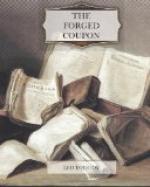The history of Tolstoy as a man of letters forms a separate page of his biography, and one into which it is not possible to enter in the brief compass of this introduction. It requires, however, a passing allusion. Tolstoy even in his early days never seems to have approached near to that manner of life which the literary man leads: neither to have shut himself up in his study, nor to have barred the entrance to disturbing friends. On the one hand, he was fond of society, and during his brief residence in St. Petersburg was never so engrossed in authorship as to forego the pleasure of a ball or evening entertainment. Little wonder, when one looks back at the brilliant young officer surrounded and petted by the great hostesses of Russia. On the other hand, he was no devotee at the literary altar. No patron of literature could claim him as his constant visitor; no inner circle of men of letters monopolised his idle hours. Afterwards, when he left the capital and settled in the country, he was almost entirely cut off from the association of literary men, and never seems to have sought their companionship. Nevertheless, he had all through his life many fast friends, among them such as the poet Fet, the novelist Chekhov, and the great Russian librarian Stassov, who often came to him. These visits always gave him pleasure. The discussions, whether on the literary movements of the day or on the merits of Goethe or the humour of Gogol, were welcome interruptions to his ever-absorbing metaphysical studies. In later life, also, though never in touch with the rising generation of authors, we find him corresponding with them, criticising their style and subject matter. When Andreev, the most modern of all modern Russian writers, came to pay his respects to Tolstoy some months before his death, he was received with cordiality, although Tolstoy, as he expressed himself afterwards, felt that there was a great gulf fixed between them.
Literature, as literature, had lost its charm for him. “You are perfectly right,” he writes to a friend; “I care only for the idea, and I pay no attention to my style.” The idea was the important thing to Tolstoy in everything that he read or wrote. When his attention was drawn to an illuminating essay on the poet Lermontov he was pleased with it, not because it demonstrated Lermontov’s position in the literary history of Russia, but because it pointed out the moral aims which underlay the wild Byronism of his works. He reproached the novelist Leskov, who had sent him his latest novel, for the “exuberance” of his flowers of speech and for his florid sentences—beautiful in their way, he says, but inexpedient and unnecessary. He even counselled the younger generation to give up poetry as a form of expression and to use prose instead. Poetry, he maintained, was always artificial and obscure. His attitude towards the art of writing remained to the end one of hostility. Whenever he caught himself working for art he was wont to reproach himself, and his diaries contain many recriminations against his own weakness in yielding to this besetting temptation. Yet to these very lapses we are indebted for this collection of fragments.




